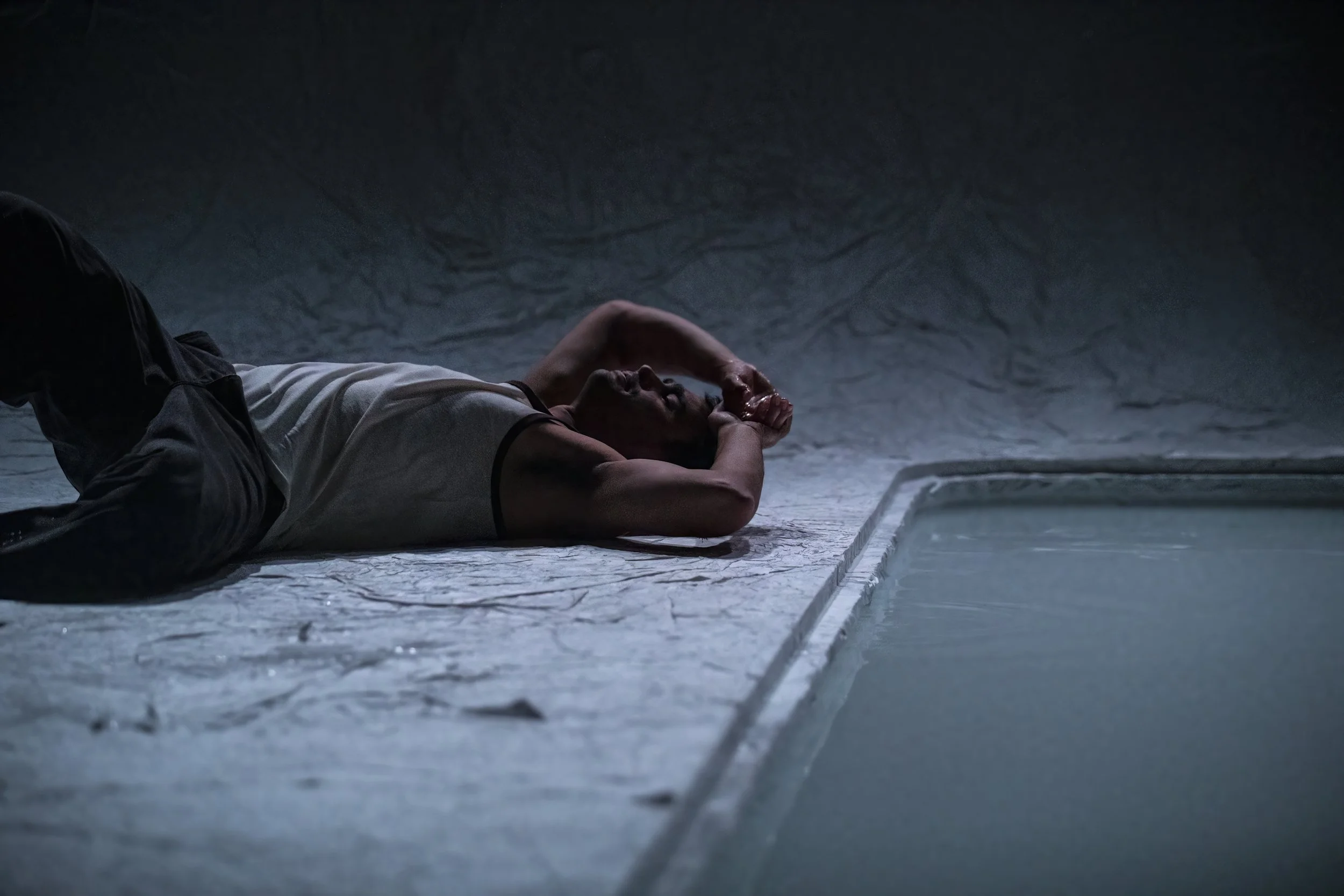Review: Blue is an enthralling portrayal of grief and love
Written and performed by Thomas Weatherall, directed by Deborah Brown
Review by Rebecca Cushway
Thomas Weatherall, now 22, began writing his monologue Blue in high school before completing the work as the Belvoir Balnaves Fellow for 2021. He is best known for his role as moody heartthrob Malakai in the recent Netflix reboot of Heartbreak High. With this debut solo work from the Kamilaroi actor, it’s clear he has mastered the coming-of-age genre – yet where his role in Heartbreak High dealt with themes of race, class, and identity, Blue tackles grief, depression, and ultimately, love.
Weatherall is not afraid to write vulnerably. The stage design by Cris Baldwin and Jacob Nash is a considered blank slate that allows this vulnerability to be communicated continuously to the audience. A white, subtly-textured wave looms above the actor as he lithely navigates the stage, partly thanks to Blue's director, Bangarra Dance Company alum, Deborah Brown. Projections and minimalist sound design fill the space as Weatherall’s fictional counterpart, Mark, describes his journey growing up with his family and the ocean. His story is brought to life by the makeshift river that opens up in the centre of the stage; Mark splashes barefoot into this ocean of his own making, recounting moments of joy, sorrow, and misunderstanding.
There are three other characters in this work: Mark’s mother, brother, and finally a small sprouting of hope in the form of his new housemate, Effy. These characters manifest like ghosts across the stage, described with such scattered and unique detail that they are as fully fleshed out as Mark himself. I could picture Mark’s mother scolding him, standing in the kitchen. I could see the boys roughhousing in the ocean in a rare moment of real connection. I could picture Effy, at the moment Mark first meets her. It is a colourful picture provided by not much more than a boy and some water on a stage.
The first tragedy of the performance is mentioned so quickly that we almost don’t have time to absorb it. Mark speaks quickly and animatedly, as though nervous, but he is in control of what exactly he confides in us and at which point in the narrative. The gut punch of grief creeps up on you and is only truly appreciated when Mark begins to describe the relationship he has with his mother. By the time the second tragedy is revealed, we can predict exactly what is coming but it hits us hard all the same.
Weatherall has achieved a small feat in his depiction of grief. I, like most in the audience, had an intermittent stream of tears running down my face throughout the performance. He plays the balance of heart-wrenching tragedy with the necessary moments of levity without diminishing the weight of Mark’s anguish. Small jokes and asides combined with incredibly honest acting carefully carry us through the journey of Mark’s own grief without allowing us to get caught up in our own. The performance is a dialogue about the causes and impacts of declining mental health, and how very ordinary the most devastating moments in our life can become.
Despite the sombre themes of Blue, the highlight of this monologue is the short aside that Mark gives on love. Mark describes love, in what appears at first quite cynically, as a burning house. He describes love as a spark and a spreading and a point of no return that ultimately ends in destruction. About halfway through this detailed and humorous analogy, I realise that this is a cover for what Mark is really trying to tell us. Mark, a 20-year-old boy who has lost so much, is putting on a display of bravado to convince us, his audience, that he does not partake in this dangerous bringing together of fuel and flame. He is telling us that he will not allow himself to be hurt again, all the while describing love with so much fervour that it is impossible to believe him.
This writing debut of Thomas Weatherall is an unmitigated success. On a stage completely bare but for a single metal chair he creates a vivid and emotive world that taps into a coming-of-age narrative that is at once both universally understandable and deeply personal. Blue is an enthralling portrayal of grief and in turn, love, that demands empathy.
Blue plays at the Belvoir St Theatre until 29 January 2023. Find tickets here.
Collage by Ceridwen Bush, production images by Joseph Mayers
Rebecca Cushway is a radio host blessed with the most luxurious radio voice in the Inner West and burdened with the ability to do everything everywhere all at once. She’s not nearly as smart as the undergrads she tutors at UTS think she is.
This review has been generously donated by Bec.
Like this review? Buy us a $5 coffee here. You can do it once, once a month, or as many times as you like.


